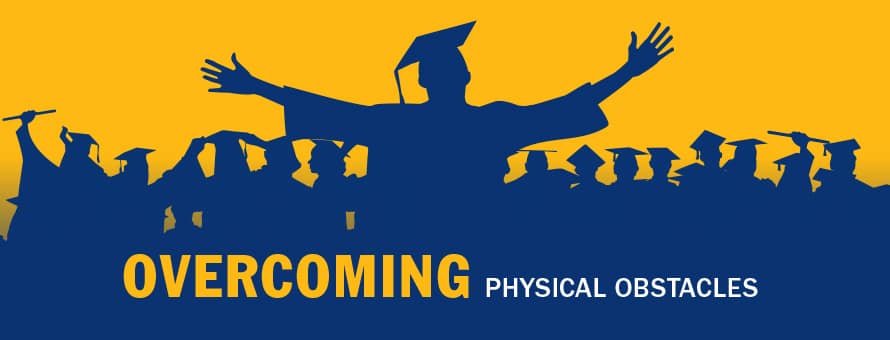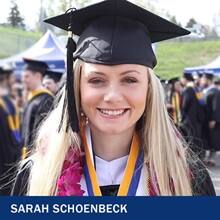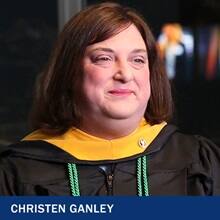Grit: Defying the Odds to Achieve Their Educational Dreams

Earning a college degree is a landmark achievement in anyone’s life, but some students show even more grit, more determination overcoming physical challenges that most of us will never face.
A Traumatic Sports Injury
Sarah Schoenbeck recently graduated from Southern New Hampshire University with a bachelor’s in elementary education with a concentration in special education. But her road to a college education was jeopardized early in high school.
 Schoenbeck was a talented soccer player and made the varsity team at her school as a freshman. During one game she leaped to head the ball and collided with another player. Their heads slammed together, and she was elbowed in the back of her neck. Schoenbeck was knocked unconscious and rushed to the hospital. When she woke up, she learned she had suffered a traumatic brain injury and a broken and dislocated neck. But that’s not all.
Schoenbeck was a talented soccer player and made the varsity team at her school as a freshman. During one game she leaped to head the ball and collided with another player. Their heads slammed together, and she was elbowed in the back of her neck. Schoenbeck was knocked unconscious and rushed to the hospital. When she woke up, she learned she had suffered a traumatic brain injury and a broken and dislocated neck. But that’s not all.
Schoenbeck also learned her family had moved. Her parents had gotten a divorce. In fact, the last memory she had was putting books in her locker in 6th grade. In addition to the physical injuries, Schoenbeck didn’t remember the previous 3 years.
“I didn’t think I’d ever be able to graduate from high school, so graduating from college is something amazing to look back on for me,” she said.
Schoenbeck has not recovered her memory of those years, and her physical recovery lasted her entire high school career. The first two years were particularly grueling as she re-learned how to walk and talk during speech and physical therapy treatments. She also suffered from post-traumatic syndrome disorder.
School, which had previously been a refuge, a “positive environment” for Schoenbeck, was now a challenge. She had to catch up on knowledge she once learned during middle school and initially, her physical stamina allowed her only short periods at school. For 3 years she took courses on a pass/fail basis, which only included pass/fail grades.
But Schoenbeck persisted. Not only did she finish high school, she earned a 3.8 GPA in SNHU’s honors program. She wants to work with immigrant populations and teach English as a second language. Schoenbeck said part of her drive came from a desire to set an example for her 3 younger siblings. They know how hard she’s worked over the past 4 years and what her degree means.
“To see the ending of it is something I think will really motivate them, too,” Schoenbeck said. “Just kind of showing them what the finish line looks like.”
A Deadly Diagnosis
Christen Ganley was at the opposite end of her educational journey when her life was upended.
 Ganley was a senior in college and planning to begin a career in higher education when she was diagnosed with a malignant brain tumor. It was a terrifying time. “The prognosis was poor, and the outcome was grave,” Ganley said.
Ganley was a senior in college and planning to begin a career in higher education when she was diagnosed with a malignant brain tumor. It was a terrifying time. “The prognosis was poor, and the outcome was grave,” Ganley said.
She was admitted to St. Jude’s Children’s Research Hospital in Memphis, Tennessee, where doctors assigned her to a research trial to treat her tumor.
“And then, amazingly enough, I kept living,” Ganley said. “I had beaten my brain tumor.”
Ganley went back to college and completed her degree and then another bachelor’s degree, this time in radiation therapy, the treatment that had saved her life. When a former teacher offered her a position as a clinical program director, she leaped at the chance but knew she would have to earn a master’s degree. But when she began those classes, “my nemesis returned,” she said.
This time the cancer had spread to Ganley’s spine. She was “shaken,” but at least knew what she was facing. More surgeries ensued and rounds of radiation that delayed her studies for years, but a second time she beat cancer.
“I was utterly discouraged and felt like the clock had been reset – that all of my progress had been lost,” Ganley said. “It was very difficult to return to school after that.”
Ganley did return to school, this time for a master’s degree, when she came to an important understanding.
“It’s really hard not to look over your shoulder when cancer has already tapped you twice. But I realized I cannot be defined by cancer, just as I cannot be defined by the letters that follow my name,” she said. “What I am defined by is the unyielding character that stood up to cancer and depression and who fights for patient rights.”
Ganley is now the clinical coordinator for Baptist College for Health Science Radiation Therapy Program, and this spring earned her master’s in higher education administration from SNHU. Education, she said, “is freedom.”
“Completing my master’s has proven to me that I can see things through to the next level,” she said. “I didn’t see that in myself before. Perhaps it was because I was faced with life and death, but now I see that the same qualities can be used to take on many other endeavors.”
A Devastating Accident
Hanna Sheppard was just 13 in August 2008 when she seriously injured herself diving into her family’s swimming pool on Long Island, New York. The impact left her paralyzed from the neck down. Doctors told her she would not walk again. She proved them wrong.

Sheppard underwent months of strenuous physical therapy and eventually was able to stand up. And then she was able to take a step. And then to walk. Sheppard kept proving doctors wrong. As she continued to recover, she graduated from high school and later earned her bachelor’s degree.
“Every injury in life is a learning opportunity, and gives you an opportunity to grow,” Sheppard said. “I would say anything is possible. You can do anything. The only thing stopping you is yourself.”
Sheppard is now fully independent despite a slight limp on her right side. Recently, as she prepared to walk across the stage to accept the Master of Business Administration in finance degree at SNHU she reflected on all she's been through. It’s an achievement that is another affirmation that her drive can lead to great accomplishments.
“I never thought I would walk again, and the doctors told me the same,” Sheppard said. “Walking across the stage at my first graduation was great, and walking across this stage will be even better because I never thought I’d even get my master’s. Here we are. It’s exciting.”
Joe Cote is a staff writer at Southern New Hampshire University. Follow him on Twitter @JoeCo2323.
Explore more content like this article

15 Years Later: A Surprise Reunion for Two Grads at Commencement

How Celebrating Small Wins Can Make a Big Difference

Heart, Hope and Some Help Along the Way: SNHU’s Fall Class of 2025
About Southern New Hampshire University

SNHU is a nonprofit, accredited university with a mission to make high-quality education more accessible and affordable for everyone.
Founded in 1932, and online since 1995, we’ve helped countless students reach their goals with flexible, career-focused programs. Our 300-acre campus in Manchester, NH is home to over 3,000 students, and we serve over 135,000 students online. Visit our about SNHU page to learn more about our mission, accreditations, leadership team, national recognitions and awards.


